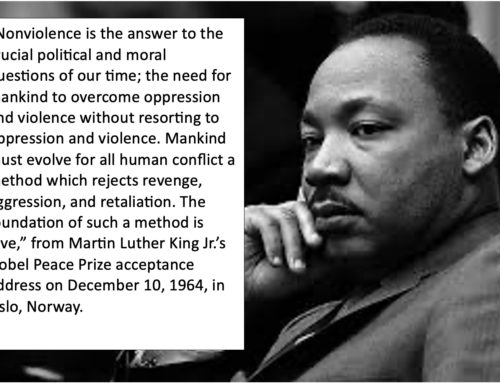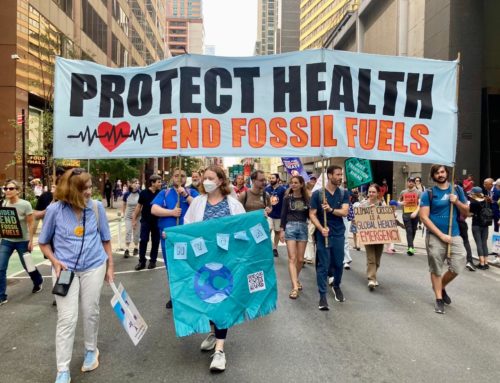
NOVEMBER 19, 2020
The Biden-Harris Administration brings opportunities to advocate for “Green New Deal” policies and regulations that will fight the climate crisis and its negative health impacts, address systemic racism and environmental injustice, and redirect government spending away from nuclear weapons and toward health care for all and a green economy. Biden-Harris have laid out ambitious plans to tackle these issues—but industries will win favors and influence—so we must keep the pressure on, especially during their first 100 days.
What are our next steps? A flurry of articles was released last week covering actions the Biden-Harris administration could take during their first 100 days without the senate, including this excellent list of action items for Biden’s first 10 days that was endorsed by many environmental NGOs and Physicians for Social Responsibility chapters.
The Biden-Harris Plan for a Clean Energy Revolution and Environmental Justice, and the Build Back Better infrastructure energy plan have three main goals: 1. ensure a 100% clean energy economy and net-zero emissions no later than 2050, 2. investment in clean energy and climate research, 3. rapidly deploy clean energy innovations across the economy, especially in underserved communities. The plans are based on Jay Inslee’s, governor of Washington State’s extraordinarily comprehensive Green New Deal instruction manual.
Inslee’s instruction manual is an impressive step-by-step guide, but to give Biden-Harris a running start in the race to address the climate crisis, the incoming Administration was given a new report, the Climate 21 Project, written by approximately 150 experts with high-level government experience, including nine former cabinet appointees. The report offers holistic, or whole-government, multi-agency climate action steps that will hopefully be overseen by a new White House National Climate Council. The effort will require every agency and policy council to take responsibility, make domestic investments, new regulations and policies, as well as repair international diplomacy, including rejoining the the Paris Climate Agreement that the Trump administration exited.
Below we have summarized some of the first steps the new administration could take and linked them to efforts that we have been focused on in California.
TRANSPORTATION
Reinstate nationwide rules for auto emissions that were put in place under the Obama administration and that are similar to California’s regulations. The regulations put in place by Trump mean that transportation emissions are expected to add nearly 900 million more tons of carbon dioxide to our atmosphere than if we had stuck with the Obama-era standards; the United States is nowhere near cutting its climate pollution by a necessary floor of at least 2.7 to 3.3 percent a year. Biden-Harris can also reinstate states’ ability to impose stricter emissions regulations than the federal standards which will enable California to lead in emission reduction standards.
In June, the California Air Resources Board adopted the nation’s first electric truck standard, the Advanced Clean Trucks Act, a ground-breaking regulation that sends a clear signal to truck manufacturers, and is a significant step in transforming the state’s freight and transportation industries. The rule, which sets zero-emission truck sales targets for manufacturers beginning in 2024, is estimated to bring 300,000 electric trucks to California’s roads by 2035, including 17,000 semi-trucks. The ACT rule can help to significantly reduce NOx and particulate matter emissions and, according to a 2019 California Air Resources Board analysis, could save Californians $9 billion in health costs.
OIL AND GAS
Biden will hopefully issue an executive order directing the Interior Secretary to end all oil and gas lease sales and permits on federal lands. Biden has said that he would not issue new leases for fracking. However, ending new leases would not stop the destruction that is currently taking place. To do that, Biden would need to void leases (on land that has not yet been developed) that were issued by the past administration. He could also require more capturing of methane from wells.
A huge concern in California is the Trump administration’s plan to auction off more than 4,000 acres of federal land in Kern County, California, near the Carrizo Plain National Monument this December. Kern County already has some of the worst air pollution in the country and drilling would add significantly to the emissions.
CLEAN ENERGY
Biden could reestablish the Obama administration’s Clean Power Plan that regulated greenhouse gas emissions from power plants, the nation’s second-largest source of global-warming gas. Trump’s replacement plan has been a gift to the coal industry and according to EPA would only reduce emissions by 0.7 percent by 2030. Better yet, Biden could implement a new plan that would meet his proposed goal of eliminating electricity production emissions by 2035.
ECONOMIC STIMULUS AND INVESTMENTS
Biden has pledged to create new green jobs to help the country recover from the economic impacts of the pandemic and hopefully move our country toward a just transition economic plan that would include funding for clean energy research and development, job training, unionized, living-wage jobs, and support for states to continue their renewable energy expansion, and tax credits for renewable energy industries.
In California, the ACT Regulation may also play an important role in California’s economic recovery by getting Californians back to work manufacturing electric trucks and building out the necessary charging infrastructure. Currently, California’s EV industry supports 276,000 direct jobs in the state, according to an early March report from the Los Angeles Economic Development Corporation.
FINANCIAL AND NATIONAL SECURITY
Biden can strengthen our country’s financial and national security by diverting funds away from nuclear weapons and other excessive military spending and toward Green New Deal solutions. Since 2010 and in a 2019 report, the U.S. Department of Defense has acknowledged that climate change is a significant threat. So why does the U.S. spends 28 times more on military security than on climate security? Driving this point home, a recent ICAN report underscores that the $138,699 spent in the world in 2019 on nuclear weapons per minute by the nuclear states would be one clear example for redirecting our resources toward a GND that would benefit, and not annihilate our civilization.
Also, just last week, the Fed requested to join the Network for Greening the Financial System, a global coalition of central banks working to manage climate risks, and they released the Financial Stability Report that warns, “Climate change adds a layer of economic uncertainty and risk that we have only begun to incorporate into our analysis of financial stability.”
ENVIRONMENTAL JUSTICE AND SYSTEMIC RACISM
SF Bay PSR believes Biden should create an Environmental Justice Advisory Board to coordinate policies across agencies and direct federal agencies to assess and mitigate environmental harms in low-income areas and communities of color. Federal agencies should coordinate to increase pollution monitoring in vulnerable communities and create mapping tools to better understand disparities, similar to California’s CalEnviroScreen database.
In general, the Biden-Harris administration’s shift toward “Green New Deal” polices gives us in California more leverage to lead by reinvigorating interest in the California COVID-19 Recovery Deal (AB 1839, originally titled the CA Green New Deal) that is focused on creating a just transition to a green, regenerative economy that is founded on climate, racial, and economic justice. If it had passed in the 2020 legislative session, it would have established a policy framework with principles and goals committed to accomplishing identified economic, environmental, and social objectives and priorities as part of the state’s COVID-19 recovery spending. The authors of the bill say AB 1839 emphasized that all Californians have the right to clean air and water, and healthy food, and would ensure access be experienced equally throughout the state’s communities.
As we turn our attentions toward our new presidential administration and the 2021 California legislative session, we ask for your help advocating at the federal and state levels.
Please make your end-of-year gift now to help us keep health professional voices in the forefront of key policy makers’ minds during this critical moment when the new administration is making decisions that will define the next four years.
THANK YOU!
Also, a special thanks to SF Bay PSR intern Sarah Bakir for her research assistance with this newsletter!!!

COMMITTEE UPDATES
We are looking for new members for our Nuclear Weapons Abolition and Environmental Health committees. To request to join a committee, please contact info@sfbaypsr.org for more details, including Zoom links to meetings.
Nuclear Weapons Abolition Committee (NWAC): SF Bay PSR Chapter
NEXT meeting will be on Thursday January 14, 7:00 pm via Zoom
Founded in June 2020, the NWAC is composed of health professionals and others working locally to influence public awareness, civic engagement, and national policy via California Members of Congress toward a nuclear weapons free world. Toward the latter, we endorse the Back from the Brink campaign and its policy platforms.
Recent highlights include:
On October 24, marking the 75th anniversary of the United Nations, the American Public Health Association (APHA) voted, at its annual meeting, to adopt a new policy calling for a “Nuclear-Free World.” The policy advocates for the U.S. government to ratify the UN Treaty and embrace the five planks of the Back from the Brink campaign. This new policy was the culmination of a year-long collaborative effort involving members of the SF Bay Area and Washington State PSR chapters.
The BIG NEWS! The United Nations Treaty on the Prohibition of Nuclear Weapons, now with 50 ratifications, will enter-into-force in 90 days, becoming legally binding for countries that have joined the treaty, most likely on January 22, 2021, two days after Inauguration Day. The UN Treaty was the direct result of a multi-year effort spearheaded by PSR’s partner the International Campaign to Abolish Nuclear Weapons (ICAN). The Treaty “prohibits nations from developing, testing, producing, manufacturing, transferring, possessing, stockpiling, using or threatening to use nuclear weapons, or allowing nuclear weapons to be stationed on their territory…[as well as] assisting, encouraging or inducing anyone to engage in any of these activities.” Read more at SF Bay PSR and in the NY Times.
Ongoing efforts with county and city policy makers to advocate for their adoption of Back from the Brink’s five point plan.
SF Bay PSR board members have also given presentations on nuclear weapons abolition at American Public Health Association, Congregation Shir Hadash in Lost Gatos, East Bay Clean Power Alliance, University of San Francisco, UCSF and Stanford medical schools. Dr. Robert M. Gould, SF Bay PSR president, participated in the webinar, “From East Bay to New Mexico, Community Power Against Nuclear Energy,” hosted by Local Clean Energy Alliance (LCEA). WATCH the recording.
READ MORE about allied nuclear policy efforts of PSR partners Beyond Nuclear and Nuclear Information Resource Service (NIRS) and divestment in nuclear industries at Don’t Bank of the Bomb.
Environmental Health Committee (EHC): SF Bay PSR Chapter
NEXT meeting will be on Wednesday, December 16, 7:00 pm, via Zoom.
Members continue to work energetically during the pandemic on wide-ranging collaborative efforts to engage health professional students and institutions to address the unceasing threats of our climate to our health.
Recent highlights include:
Racial, Environmental, and Social Justice for All: hosted our first SF Bay PSR Racial Equity Reading Group meeting and the first two webinars in our series exploring connections between climate change, systemic racism, and health inequities: “The Fire Next Time: The Devastating Effects of Climate Change, Racism, and Health Inequities on Black and Brown Communities,” watch the recording; also, watch here and read about our event, “Environmental Injustice in San Francisco’s Bayview Hunters Point: Addressing the Enduring Health Harms of Nuclear Weapons in Our Own Backyard,” in San Francisco’s Mission Local news.
Health Professional Education/Curriculum Development: EHC members participated in the American Public Health Association’s Annual Meeting, leading the Peace Caucus and many sessions, if you are a member, watch here; planned and spoke at the NorCal Symposium on Climate and Pandemic Resilience, watch recordings, which has inspired the student organizers to demand more environmental health curriculum at Stanford and UCSF; are planning and participating in the expansion of climate change education in the UCSF Department of Psychiatry and Behavioral Sciences; contributing articles and webinar presentations in a special issue and series of webinars on climate change and skin health hosted by the American Academy of Dermatology; producing the second Mini Medical School Series on climate change with a focus on shared solutions which not only address climate but also lift-up interconnected health issues; participating in the Collaborative on Health and the Environment’s webinar series: “Generation Chemical: How Environmental Exposures are Affecting Reproductive Health and Development”; exploring increased collaboration opportunities among UC Davis and UC San Francisco regarding health professional, environmental health curriculum; embedding environmental health in the MD Bridges curriculum at UCSF; organizing and teaching cross-disciplinary research inquiry courses on climate change and health; organizing student-led electives on climate change; and more.
Climate Crisis/Health Impacts/Environmental Justice: To address the intersection of the climate crisis, harmful health effects of indoor air pollution, and the disproportionate impacts on low-income communities, SF Bay PSR members have been actively advocating for system-wide electrification programs which would reduce use of fossil fuels and promote renewable alternatives to produce electricity, with synergistic improvements in air-quality. SF Bay PSR has been building partnerships with other NGOs, submitting public comments, and testifying to policy makers to bring about local ordinances, including recent efforts to replace gas- with electric-stoves, and to mandate electric infrastructure to replace gas in new residential construction. Also, toward this effort, members are actively working with the Carbon Offset Task Force at UCSF to pursue a strategy of developing offsets that would fund investing in electrification for low-income communities nearby, to directly address persistent structural inequities that have limited such necessary transformations.
Investment in a Green Economy/Divestment in Fossil Fuels: SF Bay PSR’s EHC has launched a new task force to bring together members advocating for individual, health care institutional, health professional society, and retirement fund divestment from fossil-fuels, as well those working on divestment from nuclear weapons. Members are working on targeting divestment of the personal retirement funds in UCSF and other UC systems from fossil fuels and connected industries; providing public testimony in support of the work of Fossil Free California’s CalPERS divestment campaign (see new report demonstrating that CalPERS is still investing in coal); and, also working with Climate Health Now and other partners to advance the findings of National PSR/Insure Our Future’s analysis that revealed top health insurers hold $24 billion in coal, oil, and gas investments. (See new report, and letter signed by over 60 health and environmental groups calling on divestment by health insurers.)
Sustainable Healthcare Systems/Health professional Society Collaborations:
EHC members are working with health care systems and professional societies to build a network of pediatrician climate activists across all the chapters of AAP-California; and working with various other health professional associations to become more proactive in dealing with our climate crisis that is simultaneously framing and impacting our COVID pandemic, and its disproportionate toll on communities made vulnerable by structural racism and poverty.
To join a committee please email info@sfbaypsr.org.
To read more about our committees please visit the EHC and NWAC pages.

READINGS & RESOURCES
NY Times: 9 Things the Biden Administration Could Do Quickly on the Environment
LA Times: Five things Joe Biden can do to fight climate change—without Congress’ help
NPR: Biden’s First 100 Days: Here’s What to Expect
Washington Post: How Biden aims to vamp up the government’s fight against climate change
Common Dreams: ‘Finally’: In Potential Nod to Biden Win, Federal Reserve Applies to Join Climate Network for Central Banks
Time: Joe Biden’s Novel Approach to Climate Change Could Side-Step a Divided Congress
UCSF, Program on Reproductive Health and the Environment: Recommendations to Strengthen EPA and its Mission to Protect Public Health
National Academy of Medicine webinar: Confronting Urgent Threats to Human Health & Society: COVID-19 and Climate Change
American Medical Association: Racism is a threat to public health
STAT: From a small town in North Carolina to big-city hospitals, how software infuses racism into U.S. health care
Guardian: Fifth of countries at risk of ecosystem collapse, analysis finds





